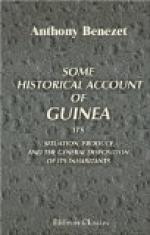It was doubtless a like sense of sympathy with that expressed by Morgan Godwyn before mentioned, for the oppressed Negroes, and like zeal for the cause of religion, so manifestly trampled upon in the case of the Negroes, which induced Richard Baxter, an eminent preacher amongst the Dissenters in the last century, in his christian directory, to express himself as follows, viz. “Do you mark how God hath followed you with plagues; and may not conscience tell you, that it is for your inhumanity to the souls and bodies of men?”—“To go as pirates; and catch up poor Negroes, or people of another land, that never forfeited life or liberty, and to make them slaves, and sell them, is one of the worst kinds of thievery in the world; and such persons are to be taken for the common enemies of mankind; and they that buy them and use them as beasts for their mere commodity, and betray, or destroy, or neglect their souls, are fitter to be called devils incarnate than christians: It is an heinous sin to buy them, unless it be in charity to deliver them. Undoubtedly they are presently bound to deliver them, because by right the man is his own, therefore no man else can have a just title to him.”
CHAP. VIII.
Griffith Hughes’s account of the number of Negroes in Barbadoes. Cannot keep up their usual number without a yearly recruit. Excessive hardships wear the Negroes down in a surprising manner. A servitude without a condition, inconsistent with reason and natural justice. The general usage the Negroes meet with in the West Indies. Inhuman calculations of the strength and lives of the Negroes. Dreadful consequences which may be expected from the cruelty exercised upon this oppressed part of mankind.
We are told by Griffith Hughes, rector of St. Lucy in Barbadoes, in his natural history of that island, printed in the year 1750, “That there were between sixty-five and seventy thousand Negroes, at that time, in the island, tho’ formerly they had a greater number. That in order to keep up a necessary number, they were obliged to have a yearly supply from Africa. That the hard labour, and often want of necessaries, which these unhappy creatures are obliged to undergo, destroy a greater number than




